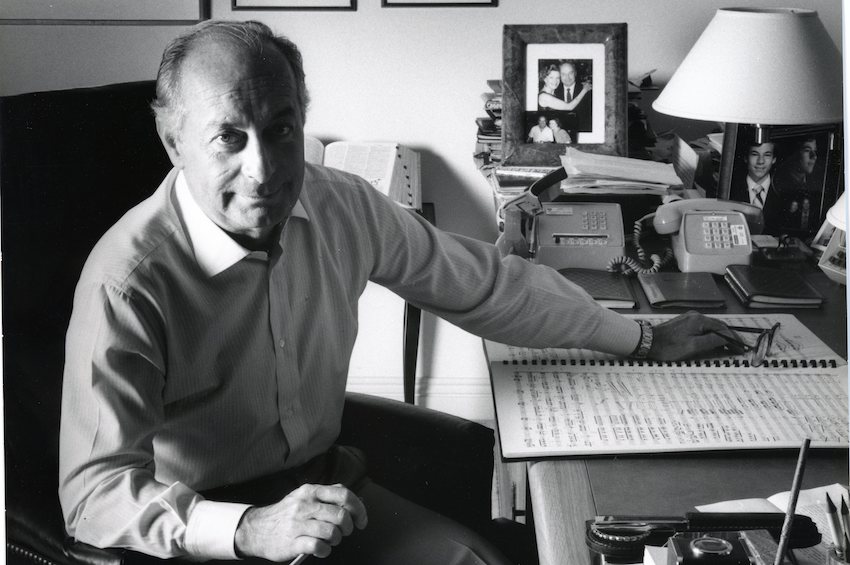Brandeis launches composition prize, hosts archives and concert series to honor renowned composer

Henri Lazarof.
“The world is big enough for all kinds of composers,” Lazarof once said. “I try to always write for new instrumental forces—to search out the limits of the performer and one’s own limits as a composer.” The Henri Lazarof International Commission Prize, entries for which are due March 15, will provide support to composers attempting to do the same today.
The annual prize is for the composition of an original work for select instruments. The specific instrumentation will change each year to complement an existing work by Henri Lazarof, and the commissioned piece will be performed alongside Lazarof's work. Instrumentation for the 2020 prize is flute, harp and viola. Electronic music components and/or multimedia may also be included. The winner will be awarded a $15,000 commission prize, and the winning composition will be performed at Brandeis University in the spring of 2021.
The Henri Lazarof Living Legacy at Brandeis, established by a gift to the university, includes the commission prize, as well as the Henri Lazarof Concert Series at Brandeis, the Henri Lazarof New Music Brandeis Annual Concert, and the Henri Lazarof Archives at Brandeis.
On Sunday, April 5, Brandeis will hold the opening of the Henri Lazarof Archives at Brandeis University and the inaugural Henri Lazarof Chamber Concert, where the first recipient of the Henri Lazarof International Commission Prize will be announced.
The archives, which consist of the composer’s scores, musical sketches, unpublished works, correspondence, personal papers and nearly 400 audiovisual items, provide a view into the career of a contemporary symphonic composer working in the second half of the twentieth century. The annual Henri Lazarof Chamber Concert, at which the commission prize winner’s composition will be premiered starting in 2021, will continue the Brandeis music department’s mission of hosting concerts that feature works by contemporary composers. The Henri Lazarof New Music Brandeis Annual Concert will fund the residency of prominent new music performers to work with graduate student composers, giving these young composers the opportunity to have their works performed by outstanding musicians.
“The Henri Lazarof Living Legacy will support a number of exciting programs and opportunities for research at Brandeis,” said Mark Berger, associate professor of the practice of music and music department chair. The support will allow Lazarof’s prolific compositional voice, which Berger describes as “exquisitely crafted and intricate, yet always highly expressive to the core,” to continue to be heard, while encouraging the creation and performance of new music.
Lazarof was the recipient of many worldwide prizes, including first place in the International Tchaikovsky Competition. He also received grants from the Ford Foundation and the National Endowment for the Arts, and earned two Grammy nominations in 1991.
“We at Brandeis are deeply honored to host the Henri Lazarof Living Legacy, celebrating a renowned alumnus and composer,” said Brandeis President Ron Liebowitz. “Mr. Lazarof lived an extraordinary 20th century life, which our university was privileged to be part of, and we are pleased to be able to perpetuate his legacy through our university and today’s composers and musicians.”
In addition to composing, Lazarof, who died in 2013 at age 81, was also a conductor, pianist and teacher. Born in Sofia, Bulgaria, he became a concert pianist at a young age, but soon switched to composing. In his youth, he became literate in French, German, Ladino and Bulgarian. Upon arriving at Brandeis, he also became fluent in English, one of seven languages he spoke fluently.
His family’s factory in Bulgaria was taken over by the Nazis during World War II, and his family emigrated to Israel when he was in his teens. He studied with Paul Ben-Haim, a prominent Israeli composer, and served in the Israeli army, writing compositions and organizing concerts for the troops. He won the first musical scholarship awarded in Israel to attend the prestigious St. Cecilia Academy of Music in Rome, studying with composer Goffredo Petrassi.
Kenneth Levy, a musicology professor at Brandeis, convinced Lazarof to move to the United States and pursue graduate studies at Brandeis. Lazarof studied with storied music professors Harold Shapero and Arthur Berger and graduated in 1959. He later moved to California, where he taught music composition at UCLA for more than 30 years, organized music festivals, and served as composer-in-residence in a variety of locations, from Berlin to Tanglewood.
The 126 works Lazarof wrote include seven symphonies, numerous concertos, 11 string quartets, vocal music, and many other chamber and symphonic works. His compositions were known for their broad range of textures, dynamics and diversity of rhythms, with many featuring unusual combinations of instruments. His works were commissioned, recorded and premiered by many orchestras throughout Europe, Asia and the United States.





